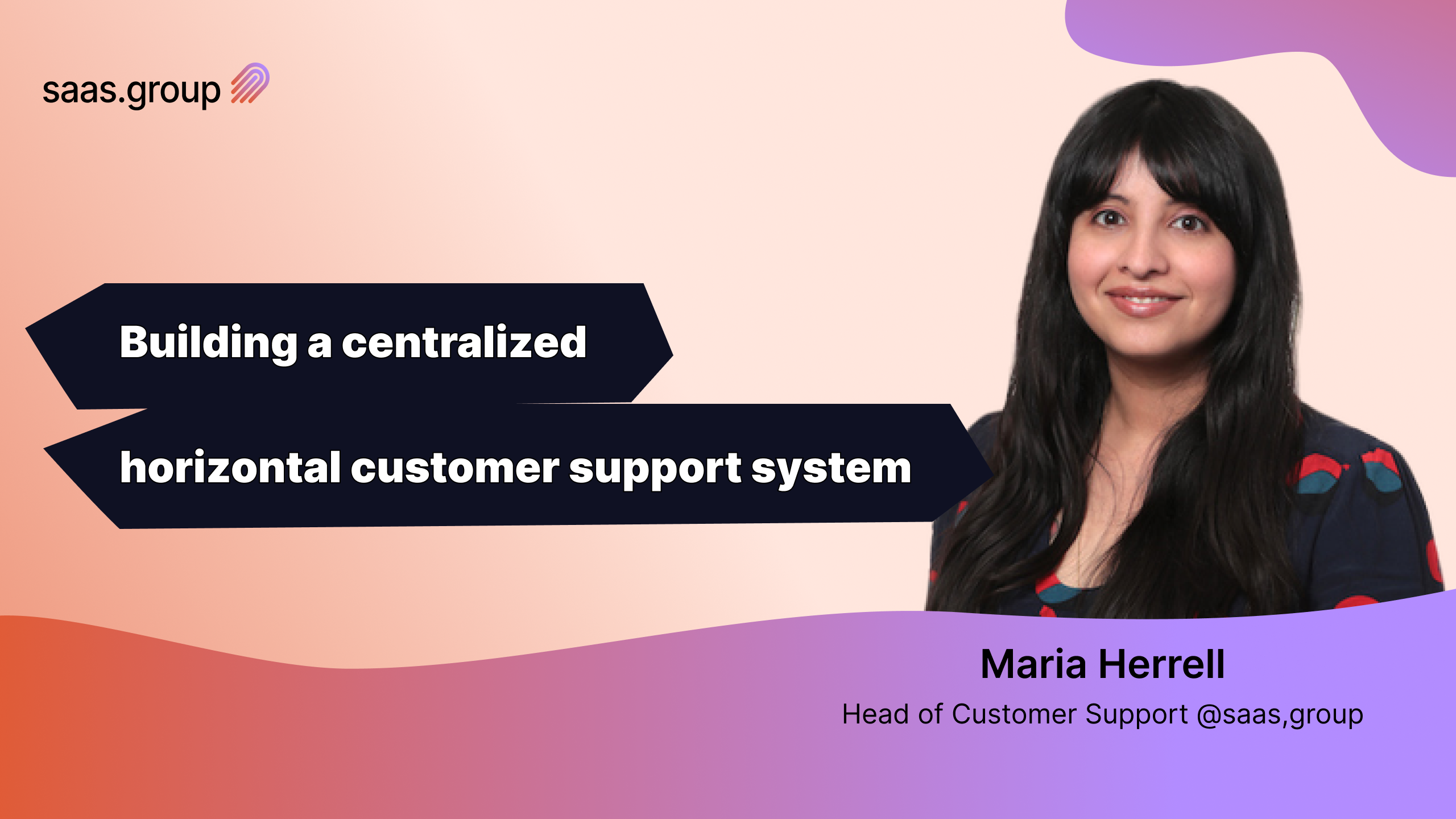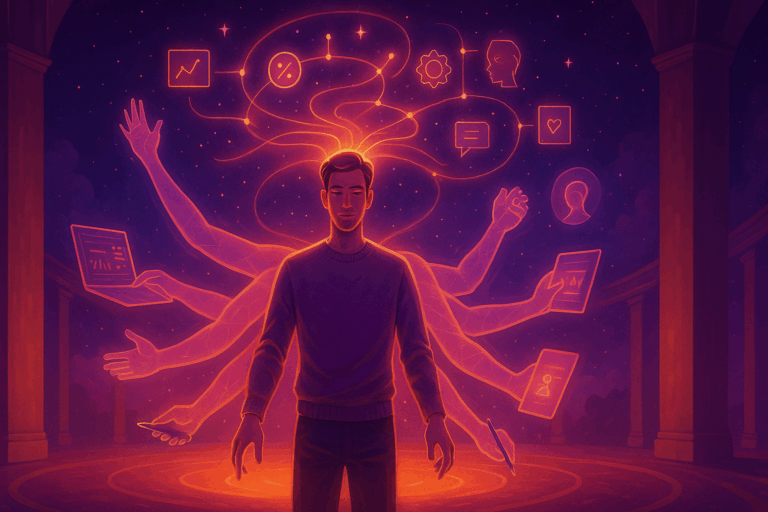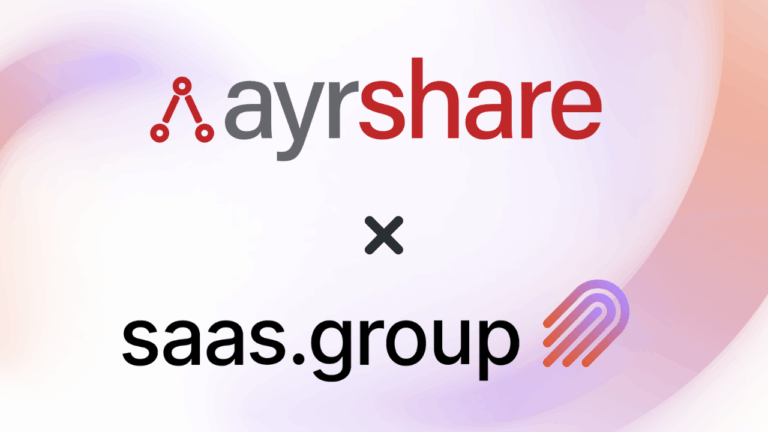Brands at saas.group are extremely focused on providing the best value to the customers because after all, happy customers stay customers longer. And a great support system is an incredible way to increase satisfaction and boost loyalty.
That’s why one of the goals of saas.group for 2024 is to implement a state-of-the-art horizontal layer of centralized support. Maria Herrell, the Head of Customer Support at saas.group, heading the development of the support system, offers some insights on the overall customer support strategy and the advantages of having it centralized for our brands.
- The Head of Customer Support is a new role at saas.group that has never existed before. Could you talk a bit about the goal for that role and your main responsibilities?
At the point in 2022 when saas.group acquired us, I was the manager of Pipeline CRM’s customer support team. Pipeline CRM was one of the more mature brands that had been acquired at that point, and so I think what was seen was that our customer support processes were well established, contributing to a high level of satisfaction and efficient resolutions for our customers.
Later, I was asked to take a look and see what could be done on the customer support side for all teams at saas.group. Saas.group’s board thought that a centralized support system could make a great resource for all the new brands entering the group, with a focus on prioritizing collaboration, and knowledge sharing, and truly help everyone grow and reach the goals that we’ve set for ourselves as an organization.
- How do we define great customer support at saas.group?
I would say that great customer support is being responsive to our customers, listening, acting on feedback, and resolving issues as quickly as we can so that our customers can get back to work growing their businesses. That is the reason that they’ve come to our tools, right? Great customer support is having brand knowledge and really understanding the problems our customers face, but also being open to hearing (and sharing internally) the feedback that the people using our product every day have to share.
- What are the benefits of a customer-centric customer service strategy?
When you prioritize your customers, you can compete with even the largest tools out there. We have pretty small teams, and a lot of our competitors have larger teams and hefty resources. Being customer-centric allows us to be impactful and grow relationships with our customers, and contribute to their success. Our team’s objectives are to be knowledgeable, and resourceful, identify opportunities for enhancing our product/service, and make sure that we keep up the collaboration across the brand to be the best we can.
- Do you have a hack, a tip, or a piece of advice for small teams? Like you said, a lot of our brands and, overall a lot of bootstrapped brands in SaaS are very small teams competing with giant companies. When your customer support team is sometimes just a founder, how to stay in control?
First I would take a look at the volumes that you’re encountering and try to understand what’s driving them. Where do they land? Is it product knowledge?
Especially now with all the AI tools, there are so many things that you can put into place to help people find the answers on their own and hopefully become confident users of your product, but also to reduce that need for somebody to look into a ticket every time.
Then, you can reserve those volumes that you’re handling for actual issues that may need to be escalated within your team. What I also noticed on the customer support front is that things are shifting a bit and that people want to be able to find the answer, if possible, without having to reach out and call support.
You still want to be reachable by your customers and be hands-on with things that require attention, but if there’s a way to anticipate common questions and provide resources in these areas, you give people the opportunity to help themselves, and that is an ideal setup for a small team.
- With the addition of the central support team, what’s important for you when you hire people for those roles?
For me, number one would be a cultural match. Does that person share the vision of the organization? Do they agree that having accountability and ownership of their work is important and just understand the team mentality?
When you’re part of a small team, everyone needs to be able to trust and count on each other to contribute.
The second would be being resourceful. No is often the easiest answer, and sometimes it’s the only one, really. But it’s also not the most helpful one. And it doesn’t feel good to try and get something done as a customer and get no for an answer.
So I think having resourcefulness and the ability to offer an alternative solution or work around the problem is incredibly useful in customer support and something that users appreciate.
I would also say kindness. You definitely want somebody who’s a great teammate and builds the culture of your team, as well as who is kind to your customers and demonstrates your company’s values in their interactions.
That’s the combination that I would be looking for in the team.
- You already mentioned that we operate in small teams and brands continue to be independent after they join saas.group, but we do encourage knowledge sharing.
And now you’re building a centralized horizontal layer of customer support. So what are the benefits of it? We have different products with different maturity levels and teams. How does it work in terms of dynamics inside all the brands?
When you join saas.group, you get access to the central team and all the shared experiences. You get together at least once a year, and the benefits of this collaboration are huge.
The priority is to allow people to collaborate while maintaining their independent brand. There’s so much to learn, and we have a unique opportunity to just talk to other founders and experts in their teams about topics like adding new features, pricing strategies, and much more.
Hopefully, the end result will be better outcomes for the team, the product, and ultimately for your customers.
- What are the biggest challenges that you see for a centralized support system and how is it possible to tackle them?
I think what’s hard is we all have different products and different users, and the challenge is trying to find something that would apply to everyone.
So I think that what we can do is just focus on the customer and how we can do our best job for them with our products and our support. As an organization, we can continue looking for the crossovers and the parallels between our brands under the saas.group umbrella.
As we grow, I think that those matches will just continue to increase. And we’ll naturally find the resources in certain areas that apply across brands.
At the moment, the brands are set up differently, sometimes without the exact same roles having the same responsibilities. In smaller teams, you have people wearing many hats and they may be performing support on top of other responsibilities. I think as we grow, we’ll understand these things a bit better and find the resources to really tackle these challenges and help our brands and their teams grow together and individually.
- What would be your best advice to founders, to teams who are just at the beginning, and just starting to think about building their first customer support team?
As I mentioned before, I think number one would be looking for a culture match. Does somebody share the vision of your organization? Do you feel like it’s a good fit and they’re going to perpetuate and treat your customers the way you do or the way they historically have been treated by your brand?
Leading by example is the key here. You show your customer support how you want your company to be viewed in terms of a certain tone or responsiveness.
Once you have your agents, it’s important to continue to really make an effort to identify their strengths and their interests. Maybe they have a knack for reporting or are great on the creative side. Maybe it’s something that isn’t necessarily your strength or capacity, but spend some effort and time to try and learn that about the people on your team because you never know how you can contribute to their professional growth. And in turn, they can contribute to the growth of your brands.
And then I would say just have trust and give enough autonomy to your people to make decisions. You want to be able to trust the people you are leaving your customers in the hands of, right? That will help foster great relationships inside the organization, growth opportunities, and a feeling of ownership for your brand.
You want people who believe in your vision and are working towards the same goal and there is a sense of pride in the work.
Building and maintaining a customer-centric approach to support is not just about addressing issues; it’s about fostering relationships and driving success for both customers and brands alike. With a centralized support system, saas.group aims to amplify collaboration, share knowledge, and ultimately enhance the customer experience across all its brands.
Check out our website’s blog page to learn more about the initiatives we explore at saas.group to drive growth and take our brands to the next level.
If our values speak to you and resonate with how you do business, get in touch. Discuss your options with our M&A team: Dirk (dirk@saas.group) or Pavel (pavel@saas.group). Learn more about how we grow acquired brands on our blog and podcast pages.
Table of Contents
Weekly newsletter
No spam. Just the latest news and articles from the world of SaaS and Acquisitions.




